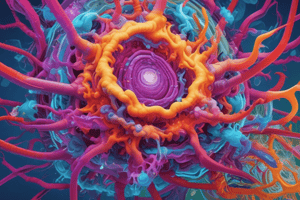Podcast
Questions and Answers
What is the process by which two separate eggs are fertilized by two different sperm called?
What is the process by which two separate eggs are fertilized by two different sperm called?
- Genetic Twins
- Dizygotic Twins (correct)
- Homozygous Twins
- Monozygotic Twins
Which type of inheritance involves multiple genes interacting to produce a trait?
Which type of inheritance involves multiple genes interacting to produce a trait?
- Recessive Inheritance
- Mendelian Inheritance
- Autosomal Inheritance
- Polygenetic Inheritance (correct)
What term describes an observable characteristic resulting from an individual's genotype?
What term describes an observable characteristic resulting from an individual's genotype?
- Allele
- Chromosome
- Phenotype (correct)
- Genotype
Which syndrome is characterized by the presence of an extra 21st chromosome?
Which syndrome is characterized by the presence of an extra 21st chromosome?
In the context of genetics, what does the term 'mutation' refer to?
In the context of genetics, what does the term 'mutation' refer to?
What does the term 'Genotype-Environment Interaction' refer to?
What does the term 'Genotype-Environment Interaction' refer to?
What does a carrier of a recessive gene possess?
What does a carrier of a recessive gene possess?
Which principle describes prenatal development proceeding from the head to the lower extremities?
Which principle describes prenatal development proceeding from the head to the lower extremities?
What type of genotype-environment correlation occurs when parents provide environments that enhance genetic traits?
What type of genotype-environment correlation occurs when parents provide environments that enhance genetic traits?
What is gestation defined as?
What is gestation defined as?
Study Notes
Key Concepts in Developmental Psychology
- Epigenesis: Environmental factors influence gene activation, altering how genes are expressed.
- Fertilization: The union of sperm and ovum creates a zygote, which undergoes repeated cell division.
- Ovulation: Monthly release of a mature ovum from the ovary until menopause.
- Dizygotic Twins: Two separately fertilized eggs; can be identical or different in sex.
- Monozygotic Twins: Result from a single fertilized egg splitting; identical genetically.
Genetic Transmission and Chromosomal Abnormalities
- Heredity: Genetic characteristics passed from parents to offspring.
- Chromosomes: DNA coils containing genes; 23 pairs in humans, including sex chromosomes (XX for females, XY for males).
- Common Chromosomal Abnormalities:
- Down Syndrome: Extra 21st chromosome; management through surgery and special education.
- Klinefelter Syndrome: Extra X chromosome (XXY); treated with hormone therapy.
- Fragile X Syndrome: Abnormal X chromosome leads to intellectual disability; intervention includes speech therapy.
Prenatal Development Stages
- Gestation: Time frame from conception to birth (37 to 41 weeks).
- Cephalocaudal Principle: Development progresses from head to lower body.
- Proximodistal Principle: Development moves from the center outward.
Early Signs of Pregnancy
- Symptoms may include:
- Tender, swollen breasts
- Fatigue and mood swings
- Nausea with or without vomiting
- Frequent urination and headaches
Germinal Stage of Development
- Duration: From fertilization to about 2 weeks.
- Blastocyst: Sphere that implants in the uterus, differentiating into layers for various functions.
- Trophoblast: Supplies nutrition to the embryo.
- Cell Layers:
- Ectoderm: Becomes skin, nails, and nervous system.
- Endoderm: Develops into the digestive system.
- Mesoderm: Forms muscles and circulatory systems.
Environmental Influences on Development
- Teratogen: Any environmental agent that disrupts normal prenatal development, potentially causing birth defects.
- Nutrition and Maternal Weight:
- Normal weight mothers face fewer complications during birth.
- Overweight mothers may encounter longer labors, higher risks of gestational diabetes, and cesarean deliveries.
Genetic Conditions and Management
- Carrier: Individuals with one recessive gene variant; may pass genetic disorders.
- Polygenic Inheritance: Traits influenced by multiple genes.
- Phenotype: Observable traits resulting from genotype interactions.
- Genotype-Environment Correlation: Environmental influences often enhance genetic traits through passive, reactive, or active experiences.
Specific Genetic Disorders
- Spina Bifida: Incomplete closure of the spinal canal, requiring surgery.
- Tay-Sachs Disease: Lipid accumulation affecting the nervous system; may require medication and special diets.
- Anencephaly: Absence of brain tissue; no known treatment.
- Polycystic Kidney Disease: Enlarged kidneys linked to developmental issues; management may include monitoring.
Studying That Suits You
Use AI to generate personalized quizzes and flashcards to suit your learning preferences.
Related Documents
Description
Explore the crucial concepts of heredity, prenatal development, and childbirth in developmental psychology as outlined by Papalia and Santrock. This quiz focuses on terms like epigenesis and fertilization, highlighting their significance in child development. Test your knowledge on how environment affects genetics and conception.




